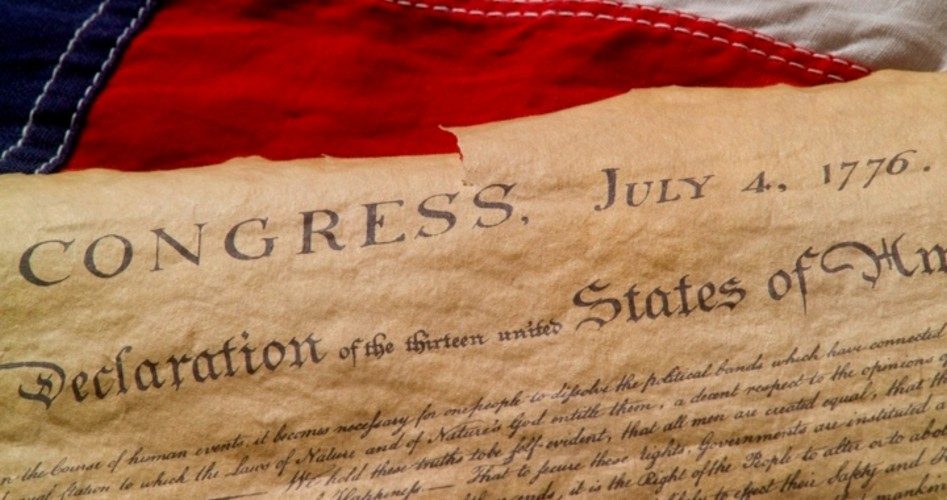
July 2, 1776. Delegates from 12 of the 13 colonies represented in the Second Continental Congress voted to formally “dissolve the political bands” that bound them to Great Britain.
Just 24 hours before that historic vote, the severing of those ties was in doubt.
On Monday, July 1, Congress resolved itself into a committee of the whole to continue debating the resolution for independence proposed nearly a month before by Virginia representative Richard Henry Lee.
John Dickinson of Pennsylvania rose and spoke eloquently — although ultimately not persuasively — in favor of pursuing peaceful attempts to reconcile with the crown.
John Adams spoke next. Refuting Dickinson’s call for calm, he reminded his colleagues of the convincing case for an unqualified declaration of independence.
When the speeches ended, delegates cast their votes; each colony cast one vote, regardless of the number of delegates present at the proceeding. Pennsylvania’s representatives were specifically instructed to oppose any call for separation from England and they voted accordingly. South Carolina joined Pennsylvania, voting no on the Lee resolutions.
New York’s delegation was also forbidden by their colonial government from voting in favor of independence, so New York abstained.
Tiny Delaware’s delegation was split — one representative in favor of independence (Thomas McKean) and one opposed (George Read) — so no vote was recorded for that colony.
The delegations of the remaining nine colonies approved the declaration of independence.
Dissolving the committee of the whole, the resolution would now be put before the Congress for a binding vote.
Edward Rutledge of South Carolina, although personally opposed to passage of Lee’s resolution calling for independence, believed that the colonies should present a unified front in the fight for freedom from British tyranny. Accordingly, he moved that the formal vote be postponed until Tuesday, July 2.
As the next day’s business got underway, representatives were surprised and pleased to hear that South Carolina had reversed her position and would vote yes on the declaration of independence. Next, the Pennsylvania contingent reported that John Dickinson and Robert Morris would demur, allowing their colleagues from Pennsylvania to vote 3-2 in favor of the resolution.
The third remarkable reversal occurred when Caesar Rodney rode in to town, tipping the Delaware delegation’s vote in favor of independence.
Upon calling the roll, the final vote on the Lee resolution declaring final and formal independence of the American colonies from Great Britain was 12 to none with one abstention: New York.
Although our independence is celebrated on July 4 (the day the final wording of the Declaration was approved by Congress and sent to the printer), the vote on July 2 and the timely swings in favor of the resolution and the revolution that happened on that day are truly historic and worthy of mention. This is particularly so in light of recent revelations regarding the scope of the tyranny of a president whose behavior is demonstrably monarchical.
The “long train of abuses” of which our forefathers accused Britain’s crown were enumerated in the Declaration of Independence. This historic indictment of King George III was penned principally by Thomas Jefferson and was laid out in a manner both methodical and lyrical. It stood on the rooftops and exposed for the all the world to hear the despotic measures levied against the American colonies by the government of Great Britain.
As our own modern government blows by the milestones on the road toward absolutism, the specific examples of the abuses of power cited in the Declaration of Independence may prove prophetic and may help to enlighten 21st-century Americans. Once we rehearse the reasons that compelled our Founders to sever ties to England, perhaps we, too, will redouble our efforts to restore liberty and the constitutional boundaries of government.
To this end, several organizations have been founded that seek to cause the drafting of a second document that would declare our independence from a federal authority that has grown unwieldy, unaccountable, and unchecked in its exercise of unconstitutional power.
One such group, for example, states on its website that “the actions of our government have created a moral and Constitutional crisis that demands a response from the people.”
Another party echoes that sentiment, proclaiming that present-day Americans “have patiently suffered mounting government outrages against us — lies, corruption, legal plunder and terror. We have waited in despair for reforms and redress, but the outrages have only gotten worse. We can now wait no longer. The fundamental rights of ‘We the People’ must be restored now.”
What of these claims? That the federal government has behaved unconstitutionally is beyond debate. Equally, few would sensibly argue that the borders of freedom have not been invaded repeatedly by bureaucratic regulations masquerading as laws.
As The New American has reported, President Obama has overseen the weaponization of the executive branch, deploying the NSA, the IRS, the EPA, and other agencies to destroy the God-given rights of life, liberty, and property.
But the threshold question when one ponders the necessity of a second Declaration of Independence is, have these actions risen to a level that our Founding Fathers believed justified the dissolution of “the political bands” that bound them to the government of Great Britain?
To illuminate the matter a bit, one might consider the following three charges against George III contained in the original Declaration of Independence and the accompanying contemporary examples of similarly suspect suppressions of America’s God-given liberty as committed by her own leaders.
1. “He has refused to Assent to Laws”:
Jefferson accused King George III of ignoring the constitution of Great Britain by taking from the American colonists the right to be represented in the legislature and by imposing his autocratic will on all who would not accede to the decrees made in the name of controlling the empire.
Rights afforded all Englishmen since the days of the Magna Carta were summarily stripped from Americans and their ability to nullify such actions through the appeal to local governments was denied by the abolition of those colonial councils.
In our own day, we have witnessed an unsettling de facto repeal of the Bill of Rights and the protections it affords. Most recently, the rescission of the Fourth Amendment has been in the news.
For years, the NSA has conducted dragnet surveillance of the phone records of millions of Americans. What’s more, in collusion with the country’s largest cyber-corporations, they monitor in real time the online activity of all Americans. There is not a single electronic communication that isn’t watched, recorded, and archived by the federal government.
While this level of totalitarianism was unknown to our colonial ancestors, they toiled for years under their own yoke of government oppression of liberty before finally throwing it off and declaring their independence from the oppressors.
2. “He has erected a multitude of New Offices, and sent hither swarms of Officers to harass our people and eat out their substance.”
So prevalent in today’s society are examples of this complaint taken from Jefferson’s indictment of the crown that it almost needs no recitation of modern re-enactments.
The IRS, to give but one example, admits that it targeted for investigation conservative groups who applied for tax-exempt status. Here’s a summary of the scandal as written by The New American’s Thomas Eddlem:
The IRS scandal involved the Tax Exempt and Government Entities Division of the IRS openly targeting Tea Party and other conservative groups applying for tax-exempt 501(c)4 “social welfare” organization status between 2010 and 2012 for extra audits and agency scrutiny. The result was a focus of IRS audits — which can cost tens of thousands of dollars and hundreds of employee hours to targeted organizations — upon the political Right, as well as delays of two years or longer in approving the tax-exempt status. Liberal groups were not selected for nearly as many audits, nor were they singled out by ideological code words, as conservatives had been.
3. “depriving us in many cases of the benefits of Trial by Jury”:
In 2011, both houses of the Congress of the United States recently passed the National Defense Authorization Act (NDAA), a bill that gave (and continues to give) the president the absolute power to arrest and detain citizens of the United States without their being informed of any criminal charges, without a trial on the merits of those charges, and without a scintilla of the due process safeguards guaranteed by the Constitution.
When asked if an American citizen indefinitely detained under the NDAA would be deprived of the right to counsel guaranteed by the Sixth Amendment, Senator Lindsey Graham (R-S.C.) responded, “When they say, ‘I want my lawyer,’ you tell them: ‘Shut up. You don’t get a lawyer.”
These provisions of the NDAA have a lot in common with other abuses enumerated in the Declaration of Independence, namely that of “waging war against us” and the use of the military to “complete the works of death, desolation, and tyranny.”
These are only a few of the examples that could be provided of ways in which our government has ceased being our servant of the people and has become our cruel master.
We are witnesses of the words of Thomas Jefferson: “Our repeated Petitions have been answered only by repeated injury. A Prince, whose character is thus marked by every act which may define a Tyrant, is unfit to be the ruler of a free people.”
Joe A. Wolverton, II, J.D. is a correspondent for The New American and travels frequently nationwide speaking on topics of nullification, the NDAA, and the surveillance state. He can be reached at [email protected].



